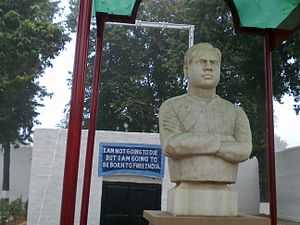Rajendra Lahiri

Rajendra Lahiri (1901–1927), also known as Rajendra Nath Lahiri, was a Bengali Hindu Brahmin revolutionary, who participated in various revolutionary activities of the Hindustan Republican Association aimed at ousting the British from India.
Brief life sketch
Rajendra Lahiri was born on 23 June 1901 in the village of Lahiri Mohanpur in District Pabna of erstwhile Bengal (now in Bangladesh). His father Kshitish Mohan Lahiri owned sufficient estate in Bengal, even then he was very active in revolutionary and nationalist activities against the British rule. He also owned a big property in Benaras city of Uttar Pradesh where his son Rajendra Lahiri was studying.
Dakshineswar bomb case
Rajendra had participated in the Dakshineswar Bomb Case and was absconded. He came to Benaras and started studying. He was a student of M.A. when the revolutionary activities started in Uttar Pradesh. Like others Rajendra also took part in the revolutionary movement and joined Hindustan Republican Association along with many other Bengali friends.
Kakori conspiracy
He participated in the Kakori train robbery of 9 August 1925. He was arrested and tried in the previous bomb case of Dakshineswar in Bengal and sent to jail for 10 years rigorous imprisonment. When the legal proceedings started in Lucknow for the train robbery, he was also included in the Kakori conspiracy case and tried along with several other revolutionaries.
Death
He was found guilty after a long trial and was hanged in the Gonda district jail on 17 December 1927, two days before the scheduled date.
